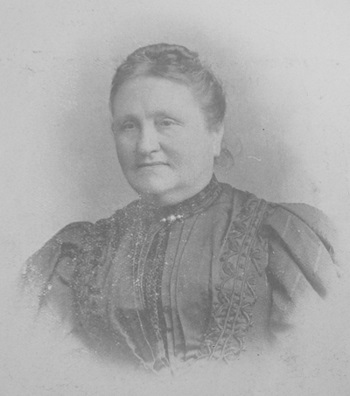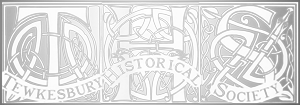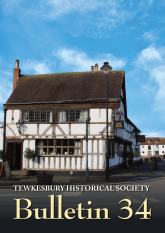Harriet McIlquham (1837-1910)
In Bulletin 13, Martin Holt wrote an article about the controversy over compulsory vaccination for children, which took place around 1900. (Martin Holt, ‘Irresponsible and Self-Seeking Faddists – Tewkesbury and the Unpopular Practice of Vaccination’, Bulletin 13 (2004) pp6-11; this article earned Martin an award from the British Association of Local History).
One of the central characters was Mrs. McIlquham, “the most outspoken against compulsory vaccination”. This lady was a member of the Board of Guardians, which suggested she was one of the earliest females to exercise political rights in the local area. We were, therefore, delighted when Jennifer expressed interest, during a visit to the Library, in pursuing this pioneer for her dissertation. (This amended article was originally submitted as a full length undergraduate dissertation to the Faculty of History, University of Southampton, May 2005).
A True Pioneer?

Harriet McIlquham (1837-1910), fought for the rights of women in local government from her home in Staverton, Gloucestershire.[1] Brought up in London, in a Unitarian family that stimulated free-thinking, she was encouraged to pay attention to questions of public importance and became interested in political issues, specifically women’s suffrage, being one of those in the Commons to hear the first women’s suffrage bill being talked out. She married James Henry McIlquham in 1858 and moved to Gloucestershire, living for a short time in Cheltenham before moving to Staverton. In 1869 she purchased a large estate in Staverton and managed it as a working farm for forty years, combining this with bringing up two children and fighting for women’s rights. As well as a large involvement in the national feminist movement, McIlquham worked in various areas of local government within Gloucestershire; this article will examine McIlquham’s role in Tewkesbury’s local government.
In nineteenth century England, women’s lives were limited due to the doctrine of the separate spheres. The Bible taught that due to Eve succumbing to temptation and eating the forbidden fruit, women were the weaker of the sexes and therefore must be controlled by men.[2] In the eighteenth century, the Evangelical revival emphasised the view that women held higher morals than men and as such derived the virtues of love and compassion. This served to reinforce the belief that women should stay in the home, where love and compassion were valued; men, who felt little compassion, held the correct, stable mindset to be involved in government and make complex decisions, unlike emotional women.[3]
In 1834, the first woman was elected as a Poor Law Guardian, and it was this position where McIlquham found her first electoral success in Boddington in the Tewkesbury Union in April 1881. Between 1834 and 1881, only a handful of women had been elected as guardians. However, McIlquham’s success stands out as she was the first married woman to be a Poor Law Guardian. Previously, it was assumed that married women were disqualified from the position due to their surrendering their property to their husband upon marriage. McIlquham, however, thanks to the 1870 Married Women’s Property Act,[4] had property in her name on which she paid the rates; as such she claimed that she was entitled to stand. The Tewkesbury Weekly Record and General Advertiser supported McIlquham’s stand and she won the election with 48 votes against her opponent’s (Mr. Henry Arkell) 27.[5]
The Record reported that her win was well received, with the village band parading the streets “amid much enthusiasm”.[6] However, the conservative paper, the Tewkesbury Weekly Register, reported a number of people “worked themselves into a distressing feverish state” and protested the result. However, the Register reported that for all these efforts, little notice was taken of them.[7] Nonetheless, events quickly changed. On 16 July 1881, it was reported that Arkell was seeking to have McIlquham’s election “set aside on the ground of some technical objection” and a public inquiry was to be held.[8] A variety of reasons were given by Arkell as to why McIlquham was not entitled to her seat, but all were quickly quashed. When the election was held again in October 1881, McIlquham was re-elected with no contest, signalling the public’s support for her and Arkell’s realisation that he was fighting a losing battle.[9]
The Record, probably as a reaction to McIlquham’s success, soon promoted other successfully elected lady guardians, although it centred on London.[10] This illustrates how previously, a rural area may have taken little interest in things which seemed to have no effect on them but, as London events were being mirrored in their area, there was a wish to find out more. McIlquham’s success can be seen as widening awareness in an area not known for political progress.
Information on the actions of the board is limited; what is available gives a small picture of what McIlquham felt was important. In January 1883, she wrote to the press criticising the staff of the local asylum, backing up her criticism with knowledge of a recent report of a visiting committee and a pamphlet written by an escaped inmate in 1871 which condemned “the inferior character of the keepers employed”.[11] This role performed by McIlquham is out of keeping with the role many believed that female guardians should perform within their sphere. This was because uncomfortable duties and issues were confronted, rather than the traditional female duties of caring for children, the elderly and dealing with the domestic aspects of workhouses.[12] However, McIlquham did in some ways fit into the norm of the female role. Throughout this period, the problem of illegitimate children was rife and people saw single mothers as a drain on society. McIlquham supported the fight to have the Local Government Board pass powers of compulsory detention for illegitimate children.[13] This was deemed a suitable campaign for a woman as it concerned the care of children.In the 1890s the question over compulsory vaccination for children, established by the 1853 and 1867 Vaccination Acts, was growing with many opposing it.[14]
It seems that individual boards could decide whether vaccination of children would be compulsory in their area and the Boddington board had very mixed feelings about the practice. McIlquham was, of all the guardians, “the most outspoken” against it. When the time to make a formal decision came in March 1896, 14, including McIlquham, out of the 29 guardians voted against compulsory vaccination. Although it was passed at this time, McIlquham and her supporters continued their campaign and, in December 1897, it was decided that each case would be considered individually.[15] This decision shows that McIlquham was part of a group that held such strong beliefs and were so consistent and persuasive with them, that they managed to resist government recommendations.
McIlquham’s acceptance as a Poor Law Guardian is cemented with her inclusion on a finance sub-committee of the Tewkesbury Board of Guardians, showing a change, at least by some, in perceptions of female capabilities.[16] The common view of women, being unable to make rational monetary decisions unless they were to do with the household, was overlooked by McIlquham’s appointment showing that she had challenged and overcome prejudices.
Even amongst all her activities as a guardian, McIlquham still felt the need to fight for more women to come forward. In November 1894, shortly before the next elections for guardians, she wrote a letter urging more women to be nominated. Although branching out against the still commonly held view that a woman’s place was in the home, McIlquham did not fully break with the ‘separate spheres’ rule. She encouraged women to stand for election because she believed that men could not educate girls in pauper schools as appropriately as ladies could. She stated that women, with philanthropic experience with the poor, were especially qualified and, with their experience of household management and economy, women could prove to be amongst the most useful members of the boards.[17] She recognised that, for women to stand for election, they had to be sure that they could keep within the roles, with which they and others felt comfortable. A week after this letter was published, she again wrote in the Record requesting more women to come forward, and tried to dispel the belief that, if elected, women would face hostility from male guardians, saying she had been treated courteously and all of her suggestions had been taken seriously.[18]
After spending 13 years as the only lady guardian in the Tewkesbury Union, two other women stood for election; Annie Priestlay and Catherine Roberts were both successfully returned.[19] As expected, McIlquham was returned unopposed, 13 years after she had first been elected as a guardian.[20]
In 1899, McIlquham became a member of Boddington’s School Board and, once appointed, wasted no time in establishing herself and her abilities. At her first meeting she nominated the vice-chairman, the rest of the board agreeing with her unanimously, illustrating the respect they held for her. She had proven herself in other areas of public work and, therefore, she appears to have met with little resistance. It also illustrates McIlquham’s character further; although her first meeting in this capacity, and the only woman present, she was not afraid to voice her opinions.[21]
Women on school boards were ultimately concerned with children’s well-being and McIlquham appears to fit into this role for much of her time on the board.[22] During the early months of 1901, obvious concerns to the board, and to McIlquham, were the effects of a local sewage farm. It was McIlquham who asked for a dissemination of the facts surrounding the farm to be sent to all local government bodies to enable a solution to be found. When a child died of diphtheria from walking past the farm on the way to school everyday, it was she who requested that the council close all open barriers around it to prevent further infection.[23] Further evidence of McIlquham’s concern for children were the votes of thanks to her passed by the board, including thanks for the “generous way” in which she treated the children, her “kind treats” and for the teas she gave them.[24]
McIlquham’s work spread across the county of Gloucestershire. In 1889 she unsuccessfully stood as a county councillor in Cheltenham and, in 1895, became a parish councillor in Staverton (this included a year of her being chairman, a position to which she was unanimously nominated). She was also one of the first female returning officers in 1896.[25] McIlquham also contributed to the national feminist movement, being a close friend of Elizabeth Wolstenholme Elmy, helped to found and was an active member of many feminist organisations, wrote in the Nineteenth Century and the Westminster Review,[26] and spoke publicly at national meetings.[27] This illustrates that whilst her electoral success was geographically limited, she ensured that she used her experience to help the wider cause nationally and when the disabilities in local government had been removed for many women, she fought for the right of women to the parliamentary franchise. Unfortunately, there is not room here to detail her extensive work outside of Tewkesbury.
Without doubt, Harriet McIlquham was a pioneering woman of her time. Her retirement from public life was much lamented and, upon her death, the obituaries to her, including a mention in The Times, emphasise just how respected she was and how contemporaries recognised her work as a great achievement.28 McIlquham has been neglected in the history of the women’s movement, and wrongly so. McIlquham worked tirelessly and uncompromisingly throughout her adult life to further the cause of women and she became an authority in her own right, being elected to a number of bodies and even becoming chairman of the local school board. She did, at times, have to conform to the ‘separate spheres’ in order to ensure her election and not to antagonise others. This meant that, as time progressed and she became more established, she could push the boundaries of the spheres. She succeeded in exciting other women to stand for office and she helped to change the law.
All this was achieved in an area unreceptive and intolerant to her ideas, until she managed to convince them otherwise; it was also in an area far removed from the established networks in London of support for female suffrage. For that, Harriet McIlquham can justly be called a true pioneer.
References
Jennifer Slack, born and educated in Huntingdon, Cambridgeshire, has just graduated with a B.A. honours degree from Southampton University. Currently working as a recruitment consultant, her career ambition is to become a lecturer in history. We are deeply grateful to Jenny for this important contribution to the history of the locality.
- Biographical information taken from Elizabeth Crawford, ‘McIlquham, Harriet, Mrs’, The Women’s Suffrage Movement: A Reference Guide 1866-1918, (London: Routledge, 2001), pp49-249; Linda Walker, ‘McIlquham, Harriet (1837-1910)’, Oxford Dictionary of National Biography, (Oxford: Oxford University Press 2004) [https://www.oxforddnb.com/view/article/41213-article.html?back=], accessed 18 January 2005.
- Robert B. Shoemaker, Gender in English Society, 1650-1850: The Emergence of Separate Spheres, (London: Longman, 1998), p16.
- Barbara Taylor, Eve and the New Jerusalem: Socialism and Feminism in the Nineteenth Century, (London: Virago, 1983), pp123-6.
- Chris Cook, Britain in the Nineteenth Century 1815 – 1914, (London: Longman, 1999), p128.
- The Tewkesbury Weekly Record and General Advertiser, 16 April 1881, p1. (Hereinafter Record).
- Record, 16 April 1881, p1.
- Tewkesbury Weekly Register, 16 April 1881, p1. (Hereinafter Register).
- Record, 16 July 1881, p1.
- Register, 16 October 1881, p1.
- Record, 23 April 1881, p1.
- Women’s Library, Autograph Letter Collection: Mrs. Harriet McIlquham, GB 0106 9/13, (1881-1909), 166, (17/01/1881).
- Mrs. Warner, ‘Poor Law Guardians’, Shafts, 1, 4, (January 1896), pp141-2, (p141); Anon, ‘An Appeal Against Female Suffrage’, The Nineteenth Century, 21, January to June 1889, (June 1889), pp781-788, (p782).
- Patricia Hollis, ‘Women in Council: Separate Spheres, Public Space’, in Equal or Different: Women’s Politics 1800 – 1914, ed. by Jane Rendall, (Oxford: Basil Blackwell, 1987), pp192-213,
- Holt, ‘Faddists’, THS Bulletin, 13 pp6-7.
- Holt,above pp7-8, 10.
- Record, (supplement), 25 April 1896.
- Record, 10 November 1894, p4.
- Record, 17 November 1894, p4.
- Record, 8 December 1894, p4. The Editor invites further research on these interesting local women. Annie Priestlay (sic) was a relation of Sir Raymond Priestley.
- Record, 22 December 1894, p5.
- GRO, SB6/1, minutes of Boddington School Board, (20/11/1899).
- Patricia Hollis, Ladies Elect: Women in English Local Government 1865-1914, (Oxford: Clarendon Press, 1987) ‘Ladies Elect’, pp186-7.
- GRO, SB6/1, minutes of Boddington School Board, (21/01/1901, 18/03/1901).
- GRO, SB6/1, minutes of Boddington School Board, (15/07/1901, 16/09/1901, 15/09/1902).
- Hollis, Women in Council, p308; GRO, P311a, PC 1/1, Staverton Parish Council Minutes, (04/12/1894); BL, Add. MS. 47451, Letters of Mrs. E.C.W. Elmy, 7 vols., (III), (11/04/1897).
- Walker, ‘McIlquham, Harriet (1837-1910)’, Oxford Dictionary of National Biography, (Oxford: Oxford University Press 2004), [https://www.oxforddnb.com/view/article/41213-article.html?back], accessed 18 January 2005; Anon, ‘Mrs. Harriet McIlquham: (A Pioneer)’, The Vote, 12 February 1910, p184.
- Harriet McIlquham, ‘Report of Proceedings at the Inaugural Meeting of the Women’s Franchise League’, London, 25 July 1889, reprinted in Hollis, Women in Public, pp316-7, (p316).
- Women’s Library, Autograph Letter Collection: Mrs. Harriet McIlquham, GB 0106 9/13, (1881-1909), 168, Letter from Mrs. Rowe to Harriet McIlquham, (21/04/1908); Gloucestershire Echo, 24 January 1910, p5; Cheltenham Chronicle, 29 January 1910, p2; Cheltenham Examiner, 27 January 1910, p5; Cheltenham Examiner, 27 January 1910, p4; The Times, 26 January 1910, p1.


Comments